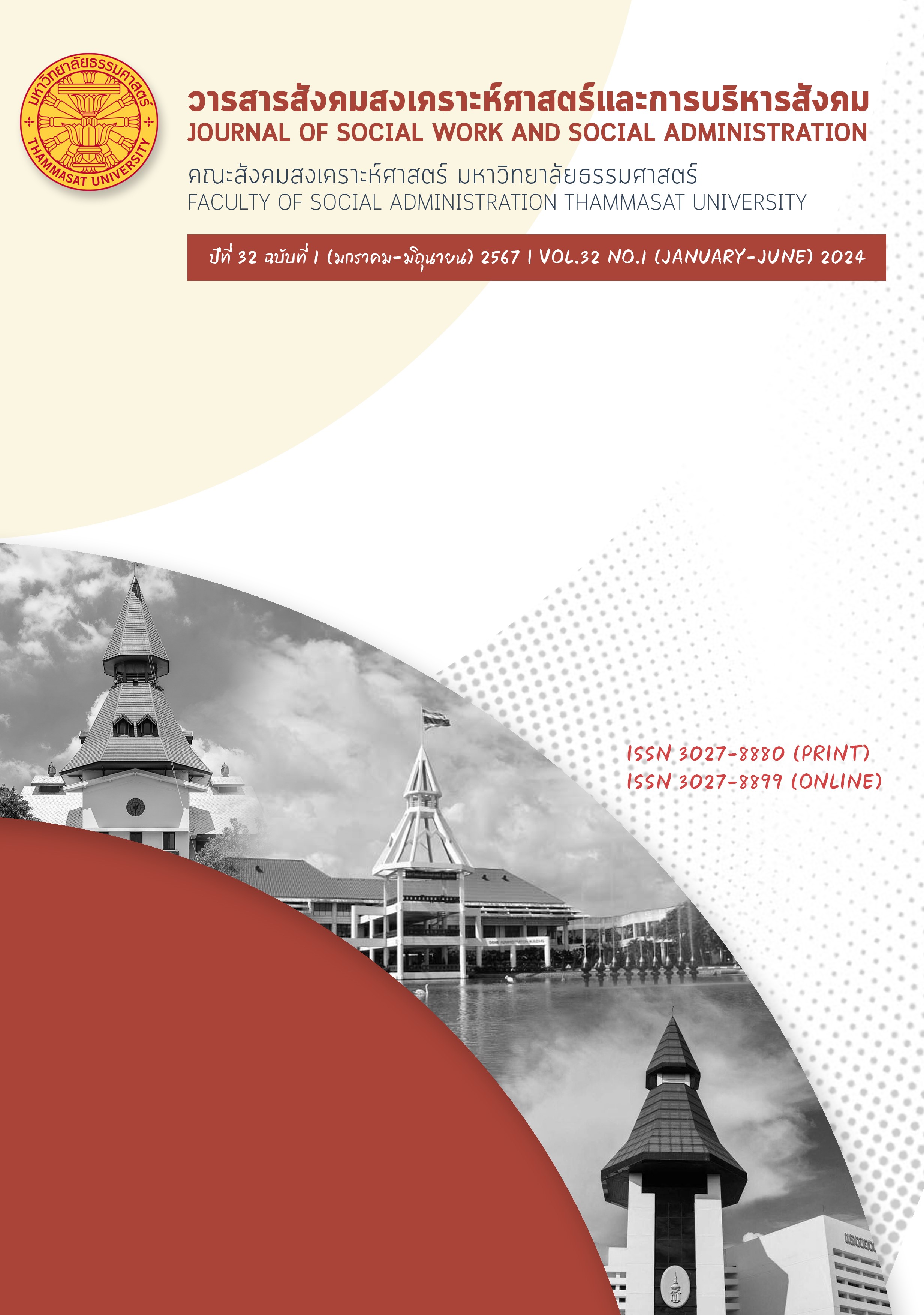Social Capital in Addressing Palliative Care Service to Patients and Their Families: Lesson Learned from Muang Nam Dam Volunteer Group and Kalasin Municipality
Keywords:
Social capital, Volunteer, Palliative care serviceAbstract
This research is a qualitative study with the objectives of examining and extracting lessons from the use of social capital in palliative care for patients and their families provided by the Muang Nam Dam volunteer group and the Kalasin municipality. It aims to recommend formal community palliative care policies for Thailand’s government municipality-level administrations in the Northeast. The study is based on field data collection through in-depth interviews with the key informants, comprising leaders and representatives from Kalasin City municipality (11 people), Muang Nam Dam and its networks (14 people), and patients and families (7 people), totaling 32 individuals. The study identified essential operational principles of the network, functioning as both a primary and secondary network, fostering teamwork, emphasizing transparency while respecting the rights and decisions of patients and families, and operating based on knowledge, which align with the characteristics of social capital. Moreover, its main aspects of care services were “being with”, providing companionship as family members, and “doing for”, offering support services to address psychological and social needs. To incorporate social capital factors, which were derived and constructed from group and network relationships, shared objectives, trust and mutual reciprocity, the study recommended that the local government should enhance the participation of the active elderly, the youth, and the educational institutes, improve readiness regarding management and appropriate timing for network expansion, adopt a holistic view of health, and apply social capital in the municipality's community health policy.
References
เทศบาลเมืองกาฬสินธุ์, กองสวัสดิการสังคม. (2562). รายงานการประเมินผลการรับรู้และความพึงพอใจในการดำเนินโครงการสร้างสุขที่ปลายทาง. สืบค้นจาก www.kalasin-mu.go.th
วรรณา จารุสมบูรณ์. (2567). นโยบายสถานชีวาภิบาล (สัมภาษณ์). กรุงเทพฯ
ศิริรัตน์ ปานอุทัย และคณะ. (2563). การสังเคราะห์ข้อเสนอระบบการดูแลแบบประคับประคองในเขตเมืองของจังหวัดเชียงใหม่. สืบค้นจาก https://kb.hsri.or.th/dspace/handle/11228/5242?locale- attribute=th
สำนักงานคณะกรรมการสุขภาพแห่งชาติ (สช.). (2563). นิยามปฏิบัติการ (Operational definition) ของคำที่เกี่ยวข้องกับเรื่องการดูแลแบบประคับประคอง (Palliative care) สำหรับประเทศไทย พศ.2563. สืบค้นจาก www.nationalhealth.or.th
เอกสารโครงการจุติสุขาวดี สร้างสุขที่ปลายทาง. (ม.ป.ป.). (อัดสำเนา).
Peaceful, Death. (2564). ถอดบทเรียนชุมชนกรุณา “การทำงาน Community Palliative Care”. สืบค้นจาก www.peacefuldeath.co
Horsfall, D., Noonan, K., & Leonard, R. (2012). Bringing our dying home: How caring for someone at end of life builds social capital and develops compassionate communities. Health Sociology Review, 21(4), 373-382. DOI: 10.5172/hesr.2012.21.4.373.
Johansson, S., Leonard, R., & Noonan, K. (2010). Caring and the generation of social capital: Twomodels for a positive relationship. International Journal of Social Welfare, 21(1), 44-52. DOI: 10.1111/j.1468-2397.2010.00759.x.
Kellehear, A. (2005). Compassionate Cities: Public health and end-of-life care. New York: Routledge.
Lewis, J., DiGiacomo, M., Currow, D., & Davidson, P. (2014). Social capital in a lower socioeconomic palliative care population: a qualitative investigation of individual, community and civic networks and relations. BMC Palliative Care, 30(13), 13-30. DOI: 10.1186/1472-684X-13-30
Peeler, A., Doran, A., Winter-Dean, L., Ijaz, M., Brittain, M., Hansford, L., Wyatt, K., Sallnow, L., & Harding, R. (2023). Public health palliative care interventions that enable communities to support people who are dying and their carers: a scoping review of studies that assess person-centered outcomes. Frontiers in Public Health, 11, DOI: 10.3389/fpubh.2023.1180571
Reeves, D., Blickem, C., Vassilev, I., Brooks, H., Kennedy, A., Richardson, G., & Rogers, A. (2014). The Contribution of Social Networks to the Health and Self-Management of Patients with Long-Term Conditions: A Longitudinal Study. PLoS One, 9(6), e98340. DOI: 10.1371/journal.pone.0098340
Downloads
Published
How to Cite
Issue
Section
License
Copyright (c) 2024 Journal of Social Work and Social Administration

This work is licensed under a Creative Commons Attribution-NonCommercial-NoDerivatives 4.0 International License.
The manuscripts published in the Social Work Journal is the copyright of the Social Work Journal, Thammasat University
Any article or opinion appeared in the Social Work Journal will solely be under the responsibility of the author The Faculty of Social Administration, Thammasat University and the editors do not need to reach in agreement or hold any responsibility.



